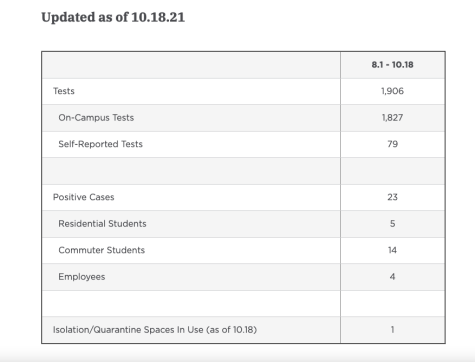Going to school with COVID-19: Quarantine and returning to class
In fall 2020, Phebe Kimble ’24 got COVID ahead of Thanksgiving Break. University policy has since changed, but Kimble said her experience was confusing and frustrating.
October 27, 2021
This is Part 2 of a 3-part series on Kimble’s COVID-19 experience. Part 1 describes Kimble’s experience getting tested on campus and how Chatham’s current policy differs. It can be read here. Part 3 discusses how Kimble is doing today, and what she and another post-COVID student think Chatham can improve.
Chatham University student Phebe Kimble ‘24 got COVID-19 last fall in the time leading up to Thanksgiving break. Her symptoms were flu-like and mild at first, but they eventually developed into severe migraines, body aches and fatigue — symptoms that are still present today, almost a full-year later.
“I was shocked at the way [Chatham] handled [my case],” Kimble said. “I don’t want to say that I was disappointed because I don’t think I had any expectations to begin with. But I was just shocked.”
After she tested positive, Kimble had difficulty finding campus resources and navigating her situation. She had what she describes as a less-than-ideal experience quarantining on campus, and she has struggled to keep up with her assignments for almost a year.
As Kimble tries to pursue her education with the aftereffects of COVID-19, she believes that there are still things Chatham can do better to support its students.
Kimble’s unpleasant quarantine experience
According to Kimble, the whole process as to what to do if someone tested positive was confusing last fall. She opted to quarantine on-campus with her roommate because Kimble has immunocompromised family members.
Panicked, Kimble remembers scrambling across Chatham websites to try to find all the information she needed. “I don’t even remember where we found the information. … We went through a few phone numbers,” she said.
Ultimately, Kimble was able to find the information through her own research, but if Chatham had consolidated resources to tell Kimble and her roommate how to sign up for an on-campus quarantine location, she said she “couldn’t find them.”
Kimble said that she and her roommate had an assigned nurse that they contacted via text message to track their daily symptoms.
When they arrived at their quarantine location, their rooms had some basics like Clorox wipes and snacks. “We didn’t get any food-food until later that night,” Kimble said.
Kimble opted last fall to get a larger portion of food delivered once every three days, rather than getting a delivery each day.
“Very random meals … like very random. It felt like they were just giving us what they had leftover or all that they had left,” she said. “We had no idea what we were going to get.
“At some point, [Chatham] forgot to send me my food,” Kimble said.
She was informed by Chatham personnel that this happened because she did not fill out a necessary form.
“But … I am pretty positive I did and it was just a mix up,” Kimble said. “It was like the very beginning of when everyone was leaving campus [for Thanksgiving] … so I think it might have just gotten confused or mixed up or something.”

Kimble was not permitted to order take-out, even with contactless delivery. According to Kimble, she was allowed one grocery delivery, which her parents dropped off through Residence Life. Her parents were not allowed to drop it off directly to her quarantine location.
“According to my mom,” Kimble said, “that was a whole entire process within itself, and it was very difficult to get a hold of [Chatham] and to pick a time to drop it off.
“If I didn’t have the stuff that my parents gave me,” Kimble said, “I probably would have been fine, but I …just wouldn’t have felt good about it. The food options that [Chatham] gave us were not great.”
According to Shawn McQuillan-Krepps, assistant dean of students, food is now delivered Mondays, Wednesdays and Fridays. The food content changes depending on how much the student wants and the student’s dietary restrictions.
Students can also now order groceries with their meal plan through Parkhurst Dining.
Students also are now sent these resources when they test positive. According to the Chatham website, “Student Health Services will provide [students] the results and directions for next steps, based on [their] specific situation and test results.”
Resources and more information about Chatham’s policies are located on my.chatham and Chatham’s official website.
Kimble was expected to attend Zoom lectures while sick. In spring, one professor wouldn’t let her complete class virtually.

During some of her worst symptoms, Kimble was also responsible for letting her professors know her situation and that she would likely miss assignments.
“[My professors] were sent an email [from Chatham] saying if the class was in-person that I wasn’t going to be there, but I was still expected to go to online classes and show up in the class Zoom.”
Kimble said that, when she had COVID, most of her professors were accommodating and gave her extra time.
“I had to reach out to them and ask for whatever help I needed,” she said. “[It] was kind of stressful because I was already dealing with trying to figure out how to handle having COVID and getting to quarantine.”
Kimble opted to complete the spring 2021 semester virtually from home.
Most professors understood why Kimble wanted to be at home. However, at one point, Kimble recalls a professor telling her that she was no longer allowed to be enrolled in a class because it was in-person and “Chatham wasn’t making them do any Zooms, so they weren’t [going to have any].
“I was forced to withdraw from the class, and I found out that the class stayed virtual for the whole year anyways,” Kimble said. “So I withdrew from that class for no reason whatsoever. It was really, really, really frustrating.”
Annette Muller, Chatham’s nurse practitioner, said that if a student tests positive, she notifies a variety of individuals on campus. For example, if a student lives on campus, Residence Life is contacted. She also contacts the Office of Academic & Accessibility Resources for accommodations.
According to Muller, this notification also occurred last fall.








